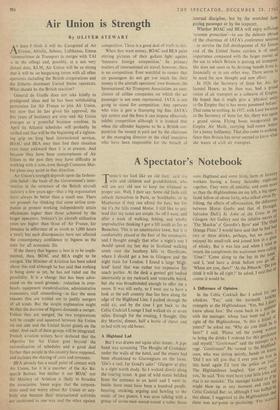Air Union is Strength
By OLIVER STEWART
A T least I think it will be. Composed of Air IAFrance, Alitalia, Sabena, Lufthansa, Union adromaritime de Transport (a merger with TAI :s in the offing) and, possibly, at a not very distant date, KLM, Air Union will be so strong that it will be on bargaining terms with all other operators including the British corporations and the hitherto dominant United States operators. What should be the British reaction?
General de Gaulle does not take kindly to predigested ideas and he has been withholding permission for Air France to join Air Union, but now that he has given his approval, the five years of hesitancy are over and Air Union emerges as a powerful business combine. In April its Atlantic schedules will probably be unified and that will be the beginning of a tighten- ing grip on long haul international services. BOAC and BEA may then find their situation even more awkward than it is at present. And because they have been contemptuous of Air Union in the past they may have difficulty in working with it now, even though Common Mar- ket plans May point in that direction.
Air Union's strength depends upon the fashion- able belief--the basis of the Government's inter- vention in the structure of the British aircraft industry a few years ago—that a big organisation must always be better than a small one. There are grounds for thinking that some airline com- panies at present working independently attain efficiencies higher than those achieved by the larger operators. Swissair's jet aircraft utilisation rates are higher than those of Air France, for instance (a difference of as much as 1,000 hours a year), but such discrepancies have not affected the contemporary confidence in bigness as the cure for all economic ills.
If the theory that bigness is best is to be imple- mented, then, BOAC and BEA ought to be merged. The Minister of Aviation has been asked about this and although he has said that nothing is being done as yet, he has not ruled out the possibility. It is a change that has been advo- cated on the usual grounds: reduction in over- heads, equipment standardisation, administrative economies, staff streamlining—in fact the same reasons that are trotted out to justify mergers of all kinds. But the simple explanation might be that the doctrine of bigness demands a merger. Unless they are merged, the two corporations will be caught and squeezed between Air Union on one side and the United States giants on the other. And each of these groups will be integrated. French aviation writers have declared that the objective for Air Union goes beyond the rationalisation of schedules and a good deal farther than people in this country have supposed, and includes the sharing of costs and revenues.
BEA already has a small point of contact with Air Union, for it is a member of the Air Re: search Bureau, but neither it nor BOAC nor the Ministry of Aviation is likely to broaden the association. Some argue that the corpora- tions need not worry about Air Union or any- body else because their international activities are cushioned in one way and the other against competition. There is a good deal of truth in this.
When they want money, BOAC and BEA paint stirring pictures of their gallant fight against 'intensive foreign competition.' In primary matters of international air travel, however, there is no competition. Ever watchful to ensure that air passengers do not get too much for their money is the aircraft operators' own bouncer, the International Air Transport Association, an asso- ciation of airline companies on which the air passenger is not even represented. IATA is not going to stand for competition. Any operator who tries it gets a thumping big fine. IATA's spy system and the fines it can imppse effectively inhibit competition although it is ironical that when the offender happens to be a British cor- poration the money is paid not by the chairman or the managing director or the chief executive who have been responsible for the breach of internal discipline, but by the wretched far paying passenger or by the taxpayer. Whether BOAC and BEA will enjoy sufficient 'revenue protection'—to use the delicate phrase of the chairman of IATIVs conference sessions -- to survive the full development of Air Union and of the United States carriers is of small importance compared with the larger matter of the use to which Britain is putting air transport. She does not seem to be deriving benefit from it, financially or in any other way. There seems fo be need for new thought and new effort. In 1926 the Secretary of State for Air, Sir Samnel 'Hoare, as he then was, had a grand vision of air transport as a cohesive of Empi!'e. He hoped that it might give a 'physical unnY, to the Empire that it has never possessed before. That came to nothing. In 1937, with Lord Swinton as the Secretary of State for Air, there was again a grand vision, Flying boats inaugurated the. Empire Air Mails, carrying half-ounce let,ter' for a penny halfpenny. That also came to nothing. Since then Britain has never seemed to know vi'hot she wants of civil air transport.






























 Previous page
Previous page